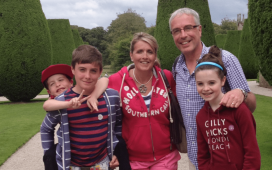To call Raising a School Shooter (BBC Four) a study of grief is to understate the case by some distance. It is more a study of how much pain can be compressed into one person without fully breaking them.
The Storyville documentary tells the story, largely in its subjects’ own words, of the parents of three students responsible for taking weapons into their schools and killing classmates and staff. In 1988, Clarence Elliot’s 16-year-old son Nicholas took three firebombs, a semi-automatic pistol and 200 rounds of ammunition into Atlantic Shores Christian School in Virginia and killed one teacher and injured another. He was sentenced to life imprisonment and is still in jail.
In 2001, Jeff Williams drove to his son Andy’s school after being alerted about an armed incident there. He came across two of his son’s classmates in the chaotic car park and they told him Andy was responsible. “I went to the nearest police officer and said, ‘I think I’m the shooter’s father,’” he says, the flat disbelief and despair in his voice still audible after 20 years.
Finally, there was Sue Klebold, whose son Dylan was one of the two students responsible for the worst and most infamous high-school shooting of them all. Dylan and Eric Harris killed 13 people and wounded 24 others at Columbine, in Colorado, in 1999, before killing themselves. His mother says she was largely in denial about everything, including the diaries and writings that showed how premeditated the massacre had been, until the police gave the family a presentation of everything they had found six months later. “I had been grieving so much for this lost, precious child and who he was. And that was the point I realised who he was to everyone else in the world. Everything died in my world. God died, my belief in truth, my belief in what our family was, my belief in who Dylan was. Everything was torn apart.”
Klebold cuts an astonishing figure in every way, a woman rebuilt from the ground up. She sits absolutely still and talks absolutely calmly, delineating and anatomising the full catastrophe without self-pity, without any plea for mitigation or exoneration and with the bone-deep knowledge of the worst that humanity is capable of.
In the inevitably twisted way of these things, she was undoubtedly the star of the show. But the documentary was careful to give countervailing time and space to Elliot’s and Williams’s stories, too. All underwent ostracisation and were the targets of abuse within their neighbourhoods and communities, the flames of misunderstanding and vitriol fuelled by media reporting (especially of rumours and inaccuracies). Nicholas Elliot’s father says Nicholas had undergone bullying which was never fully addressed. His sentence was maximal and he has been denied parole six times. It’s noticeable that he is black, which is not to claim these were the wrong decisions – only to acknowledge the possibility that they weren’t born out of wholly unprejudiced judgments and that this, too, has an impact on the family.
Raising a School Shooter is a sure-footed documentary, as is to be expected from the Storyville stable. You could think of it as the other side of the pageantry this strange little island of ours is known for. We can dress up meaningless things beautifully and provide a stately spectacle with the best of them – but we can also strip meaningful things down and let them stand unadorned, unsentimentalised, and let their power speak for itself. That is what the best of our documentary strands do, and it is a skill and talent shown to some of its best advantage here. Three stories with so many aspects and layers of loss to each are examined with intelligence, nuance and compassion. The question of why, of how such things could happen, is asked but a single answer never demanded. In a world filled with the roar of idiot-cannon and escalating culture wars, it feels like an increasingly rare moment of grace.
Klebold concluded that her son’s ability to dehumanise people was a huge factor in enabling his actions. “And I hear it all the time [now] – in politics, on the news, when people blame and reduce people to an element of themselves, forgetting the 99.9% of that human being we have in common … The greatest protection we have is connection.”














